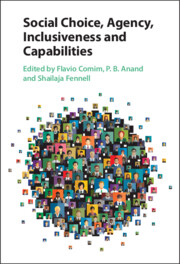Book contents
- Social Choice, Agency, Inclusiveness and Capabilities
- Social Choice, Agency, Inclusiveness and Capabilities
- Copyright page
- Contents
- Figures
- Tables
- Contributors
- Preface and Acknowledgements
- 1 Introduction: social choice, agency, inclusiveness and capabilities
- Part I Social Choice and Capabilities
- 2 The many facets of social choice theory
- 3 Beyond capabilities?
- 4 Examining the challenge of communication in diffusing innovative education programmes
- 5 Nudging the capabilities for a sustainable city?
- 6 Social choice and research capacity strengthening in Nigeria
- Part II Inclusiveness, Social and Individual Agency
- Part III Social Choice and Capabilities in Action
- Index
- References
5 - Nudging the capabilities for a sustainable city?
When the libertarian paternalist meets the Paretian liberal
from Part I - Social Choice and Capabilities
Published online by Cambridge University Press: 28 March 2024
- Social Choice, Agency, Inclusiveness and Capabilities
- Social Choice, Agency, Inclusiveness and Capabilities
- Copyright page
- Contents
- Figures
- Tables
- Contributors
- Preface and Acknowledgements
- 1 Introduction: social choice, agency, inclusiveness and capabilities
- Part I Social Choice and Capabilities
- 2 The many facets of social choice theory
- 3 Beyond capabilities?
- 4 Examining the challenge of communication in diffusing innovative education programmes
- 5 Nudging the capabilities for a sustainable city?
- 6 Social choice and research capacity strengthening in Nigeria
- Part II Inclusiveness, Social and Individual Agency
- Part III Social Choice and Capabilities in Action
- Index
- References
Summary
The aim of this chapter is to explore how social choice theory and the capability approach can help in clarifying important ethical dilemmas and issues of injustice that need to be addressed for cities to become sustainable cities. Six types of important injustices are identified, covering both intra- and intergenerational fairness. Some important criticisms of smart cities are considered and important safeguards and policy priorities for smart cities from the social choice and capability approach framings are identified. The main message of this chapter is that the sustainability of cities is an ethical issue and not one of technology or measurement, and it is all about the six types of injustices, with cities needing to tackle all six of them in their quest to become sustainable. Nudging and smart cities can help, but these must be contextualized to prioritize participation and equality. Social choice theory as formulated by Amartya Sen provides important insights to understand and deal with conflicts between the different demands on the freedoms of different individuals.
- Type
- Chapter
- Information
- Social Choice, Agency, Inclusiveness and Capabilities , pp. 85 - 112Publisher: Cambridge University PressPrint publication year: 2024

